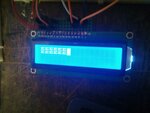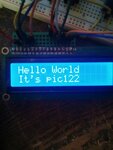picmonkey122
Newbie level 4

- Joined
- Jul 10, 2014
- Messages
- 6
- Helped
- 0
- Reputation
- 0
- Reaction score
- 0
- Trophy points
- 1
- Activity points
- 43
Hi everyone,
I have a problem with writing to a hitachi hd44780 16x2 display using the PIC16F1459. I have written several programs in C for this particular arrangement so I know from this that the wiring, LCD and PIC are all working correctly. I decided to switch over to writing in assembly because I wanted more control over the PIC. I am not a beginner with assembly would say I have a moderate understanding and have searched around a lot of forums and websites to better understand writing assembly for PIC's. However I cant seem to get the LCD to print out the correct characters. The code attached below initialises the LCD correctly - 16 boxes over 2 lines but when I want to write to it I can only get the LCD to print out strange characters (see attached photo).

I have a few ideas what might be wrong the obvious one is the LCD_Write subroutine also I'm wondering whether the PIC is correctly initialised. I would be grateful if you could look over the code.
Thanks.
I have a problem with writing to a hitachi hd44780 16x2 display using the PIC16F1459. I have written several programs in C for this particular arrangement so I know from this that the wiring, LCD and PIC are all working correctly. I decided to switch over to writing in assembly because I wanted more control over the PIC. I am not a beginner with assembly would say I have a moderate understanding and have searched around a lot of forums and websites to better understand writing assembly for PIC's. However I cant seem to get the LCD to print out the correct characters. The code attached below initialises the LCD correctly - 16 boxes over 2 lines but when I want to write to it I can only get the LCD to print out strange characters (see attached photo).

Code:
;***************************************
; date: Tue 8th July *
; version: 1.0 *
; filename: LCD *
; PIC: p16f1459 *
; clock frequency: 4MHz *
; cty: 1 us *
;**************************************
;=================
; Config Settings
list P=16f1459
include "p16f1459.inc"
; CONFIG1
; __config 0x3FE4
__CONFIG _CONFIG1, _FOSC_INTOSC & _WDTE_OFF & _PWRTE_OFF & _MCLRE_ON & _CP_OFF & _BOREN_ON & _CLKOUTEN_OFF & _IESO_ON & _FCMEN_ON
; CONFIG2
; __config 0x1FFF
__CONFIG _CONFIG2, _WRT_OFF & _CPUDIV_CLKDIV6 & _USBLSCLK_48MHz & _PLLMULT_3x & _PLLEN_ENABLED & _STVREN_ON & _BORV_LO & _LPBOR_OFF & _LVP_OFF
;======================
; Declarations
#define LCD_PORT LATC
#define LCD_RS LATC,4
#define LCD_E LATC,5
; RW is grounded
; D4 ----> RC0
; D5 ----> RC1
; D6 ----> RC2
; D7 ----> RC3
;=====================
; Variable Definitions
cblock H'20'
count
delay_1
delay_2
delay_3
tempLCD
endc
;==============
; Reset Vector
org 0x0000
goto Start
Init
;====================
; Disable comparators
bcf CM1CON0,C1ON ; clear C1ON
bcf CM2CON0,C2ON ; clear C2ON
;========================
;Set Oscillator frequency
banksel OSCCON
movlw B'11110111' ; 4MHz internal oscillator ; cty = 1us
movwf OSCCON
banksel TRISC ; select LCD bus
movlw B'00000000' ; all pins output
movwf TRISC
banksel LATC
clrf LATC
banksel ANSELC
clrf ANSELC
; initialisation delay - 1 sec
movlw D'100'
call delay_long
return
;============================================
; Delay subroutine which lasts for 100 * cty
delay_long
movwf delay_3
delay_long_loop2
movlw D'13'
movwf delay_2
clrf delay_1
delay_long_loop1
decfsz delay_1,f
goto delay_long_loop1
decfsz delay_2,f
goto delay_long_loop1
decfsz delay_3,f
goto delay_long_loop2
return
;=========================
; Delay subroutine 10 * cty
delay_short
movwf delay_2
delay_short_loop2
movlw D'249'
movwf delay_1
delay_short_loop1
nop
decfsz delay_1,f
goto delay_short_loop1
decfsz delay_2,f
goto delay_short_loop2
return
;==================
;LCD Initialisation
LCD_Init
banksel LATC
bcf LCD_RS ; commands so RS bit low
movlw D'16'
call delay_short
banksel LATC
movlw 0x03
movwf LCD_PORT
call Nibble
movlw D'6'
call delay_short
banksel LATC
movlw 0x03
movwf LCD_PORT
call Nibble
movlw D'1'
call delay_short
banksel LATC
movlw 0x03
movwf LCD_PORT
call Nibble
movlw D'5'
call delay_short
banksel LATC
movlw 0x20 ; set 4 bit mode
movwf LCD_PORT
call Nibble
movlw 0x28 ; 2 lines, 5 x 7 font
call LCD_Cmd
movlw 0x08 ; display switch: D = 0, C = 0, B = 0
call LCD_Cmd
movlw 0x0F ; display switch: D = 1, C = 1, B = 1
call LCD_Cmd
call LCD_Clear ; clear display
movlw 0x06 ; input set: I/D = 1, S = 0
call LCD_Cmd
return
;============
; Send nibble
Nibble
banksel LATC
bsf LCD_E ; high
movlw D'1'
call delay_short
banksel LATC
bcf LCD_E ; low
movlw D'2'
call delay_short
return
;============
; LCD Command
LCD_Cmd
movwf tempLCD
swapf tempLCD ; higher nibble to W
movfw tempLCD
andlw 0xF0
banksel LATC
bcf LCD_RS ; RS set low due to instruction write
banksel LATC
movwf LCD_PORT
call Nibble
movlw D'2'
call delay_short
swapf tempLCD ; lower nibble to W
movfw tempLCD
andlw 0xF0
banksel LATC
bcf LCD_RS
banksel LATC
movwf LCD_PORT
banksel LATC
bcf LCD_RS
call Nibble
movlw D'10'
call delay_short
return
;==========
; LCD Write
LCD_Write
movwf tempLCD
swapf tempLCD ; higher nibble to W
movfw tempLCD
andlw 0xF0
banksel LATC
bsf LCD_RS ; RS set high due to data write
banksel LATC
movwf LCD_PORT
call Nibble
movlw D'2'
call delay_short
swapf tempLCD ; lower nibble to W
movfw tempLCD
andlw 0xF0
banksel LATC
bsf LCD_RS
banksel LATC
movwf LCD_PORT
call Nibble
movlw D'10'
call delay_short
return
;===========
; LCD line 1
LCD_Line1
movlw 0x80
call LCD_Cmd
return
;===========
; LCD line 2
LCD_Line2
movlw 0xC0
call LCD_Cmd
return
;==============
; Clear Command
LCD_Clear
movwf 0x01
call LCD_Cmd
return
;=============
; Program main
Start
call Init
call LCD_Init
Main
movlw 0x50 ;P
call LCD_Write
movlw 0x49 ;I
call LCD_Write
movlw 0x43 ;C
call LCD_Write
goto $ ; loop forever
endI have a few ideas what might be wrong the obvious one is the LCD_Write subroutine also I'm wondering whether the PIC is correctly initialised. I would be grateful if you could look over the code.
Thanks.



